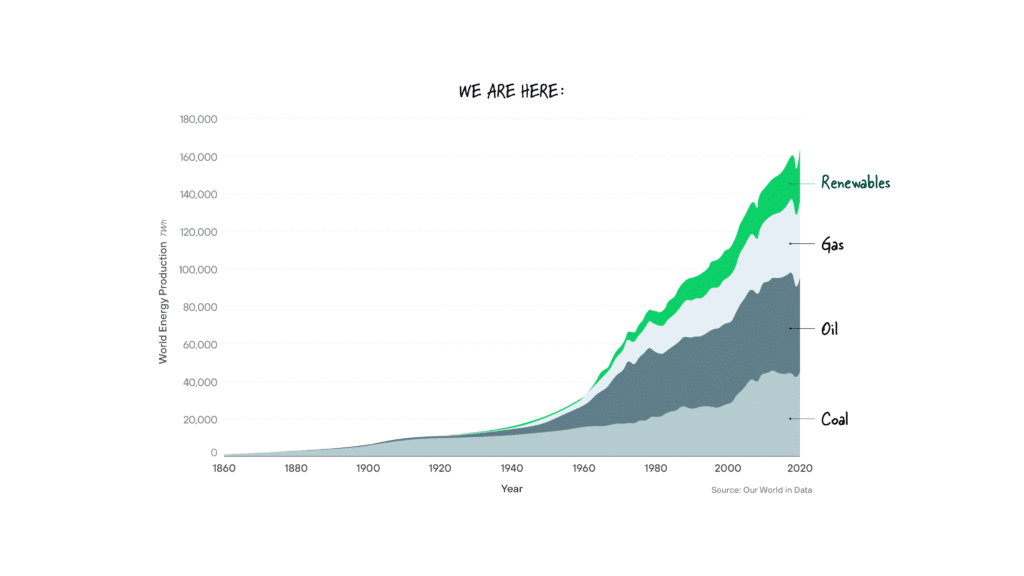Rebranding Dinosaurs: The Strategist’s Dilemma
Integrating sustainability into brand building to advance the transition the world needs.
There’s a school of thought that strategists, branding companies, and PR and advertising agencies should band together and not work with fossil fuel companies, i.e., those whose primary business is the extraction, processing, transportation or sale of gas, oil and coal.
There is no doubt that fossil fuel consumption is contributing to climate change. We need to phase in alternatives and abate greenhouse gas emissions, then capture and offset the balance to move towards net-zero emissions as soon as possible.
However, rather than isolating the extractive industries and calling the kettle black (all of us are fossil fuel consumers either directly or through products made from oil and natural gas derivatives, from smart phones and laptops to shoe polish and lipstick), we need a holistic view of the situation the world finds itself in. Almost every industry has impacts and it’s important to recognise the nuances. This calls for a new approach to understand how to integrate sustainability into brands and their activities along the value chain to help millions of consumers to transition to cleaner energy and sustainable lifestyles.
Being of a certain age (I worked on branding for the world’s largest oil trader when that was still cool), and in a reflective mood, I’ll borrow a line from David Bowie’s penultimate album; where are we now?

Fossil fuels provide about 80% of the world’s current energy needs—a proportion that is still growing.
While we must remain optimistic that this trend will be reversed, the reality is that we are too late to prevent warming of 1.5 degrees above pre-industrialisation averages. We may also have transcended the tipping points that will push temperatures to catastrophic 3 to 4 degree increases.
The grim truth is that as the world has grown richer in terms of digits in bank accounts, natural capital, upon which the survival of our civilisation ultimately rests, is disappearing and being degraded.
The so-called “developed” nations have gleaned the benefits of industrialisation and creating the resulting pollution. Now the growing middle classes in Asia and in developing countries share the same aspirations of development, and it’s not fair to expect them to wait for clean energy before switching on their aircons.
Net-zero emissions has to be the goal as we first transition to carbon neutrality along the way. There’s no disputing that developed countries need to change the most on this journey, implying economic development without increased consumption.
Yet as consumers, we sometimes say one thing and do another. We understand we need to do our bit but it’s nowhere near enough to bring us to par with the much lower energy consumption per head in emerging economies.
Meanwhile energy demand continues to outstrip our collective willingness to make deep sacrifices and ability to deploy solutions. The transition to clean is going to be a bumpy ride.
Transition, Transmission, Transformation
If this is where we are then, facing a lengthy, politically fraught energy transition, what is the role of sustainability and brand strategists?
Transition requires upgrading power distribution grids to facilitate the input from multiple new energy sources and to get it to where it’s needed. It’s a massive task. As energy sources such as solar, wind and wave are highly variable, the only way to optimise is at scale with storage capabilities. To do this we’re talking about continent-sized power grids moving energy to where it’s needed when it’s needed.
The expertise, staffing, skills and resources needed sit partly within established energy companies. Ostracising these brands and vilifying the people working within these businesses may be therapeutic but is not conducive to progress. We’re relying on these people to supply reliable, safe energy through a system that will be fundamentally transformed, in some cases within the span of their careers.
On their way to net zero, the fossil dinosaurs will need new stories. Not greenwashing, but credible sustainability strategies and narratives based on transparency, accuracy and honesty. This, together with clear transition planning, is needed to build trust with increasingly climate change aware employees, partners, governments, investors and consumers. In order for people to believe in change, sustainability must be embedded in the business model and culture, as well as the brand.
Innovation will spawn new products and services. Many will originate from traditional fossil fuel businesses changing perceptions of these brands.
Brand transformation is not new. Brand sustainability, or longevity, is a hallmark of valuable brands alongside relevance and differentiation.
Brands evolve and sometimes make pivotal changes to maintain relevance. But advertising and PR agencies promote a brand, they do not shape it. In other words, they cannot change the brief or influence the behaviours of their clients. If it is a greenwashing brief, it is a greenwashing brief, no matter what they do. Their only option is to comply or turn down the business.
On the other hand, brand-building experts work with client leadership to define what their businesses stand for, crafting the essence of the brand. Traditionally they are adept at creating brand strategies, and identities, telling brand stories and developing brand experiences. Now, contemporary consultancies must integrate sustainability expertise into their services. This enables them to develop sustainability strategies that turn risks into opportunities, and engage employees and other stakeholders to drive change through shared value creation. All of which manifests itself in sustainable profitability for clients and in meaningful work for talented people.
Instead of isolating one dirty industry, how about we all adopt guiding principles that recognise the interconnectedness of the issues and promote transition and adaptation through engagement with all businesses and brands prepared to be held accountable for their actions. Clear red lines. No greenwashing.
To echo Bowie again: let’s dance—collaborate, influence, persuade, educate our teams and help clients plan for the transition. While we still can.







